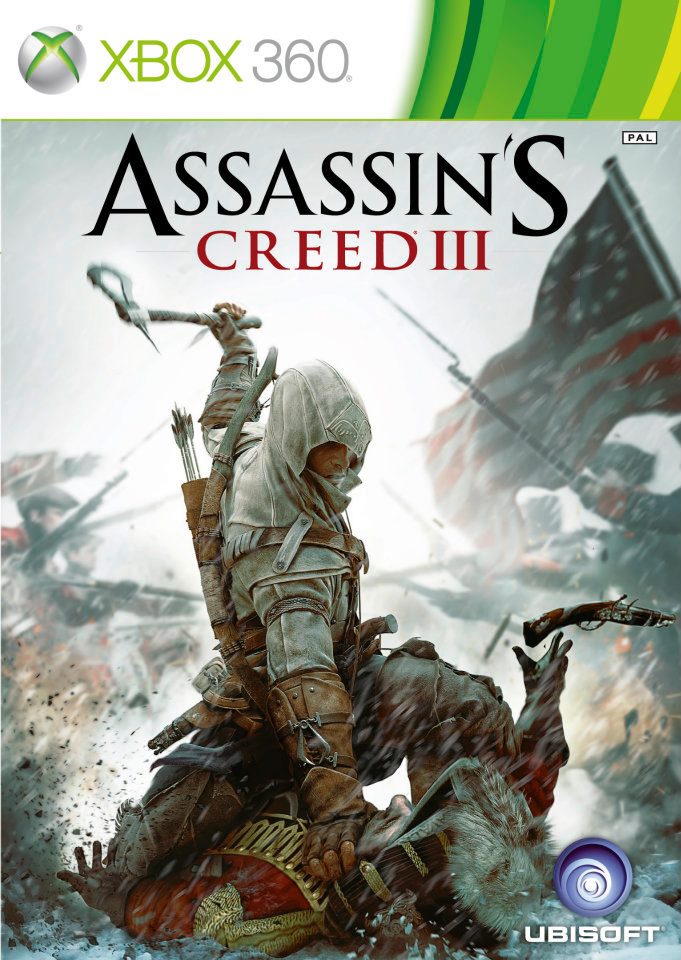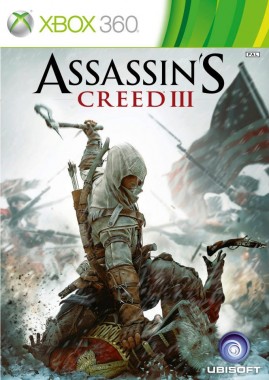
Assassin’s Creed 3
Developer: Ubisoft Montreal
Publisher: Ubisoft
Platform: Xbox 360 (reviewed), Playstation 3, Wii U and PC
Release Date: 31st October, 2012
Price: $59.99 – Available Here
Overview:
The Assassin’s Creed franchise has built a name for itself as one of the most premier series in the current gaming landscape. It is without a doubt one of the biggest franchises and as such whenever a new installment of Assassin’s Creed is released it is usually followed by a great deal of hype and anticipation. Assassin’s Creed 3 however was a different level of hype altogether. This game promised to be a revolution, a new direction for a franchise that many believed was in need of a shot in the arm, a different take, a fresh start – a change.
Assassin’s Creed 3 without a shadow of doubt accomplished these things. It is vastly different to previous installments. It’s got a new setting, different staff behind it and new gameplay mechanics to boot. But is it the revolution that it was promised to be?
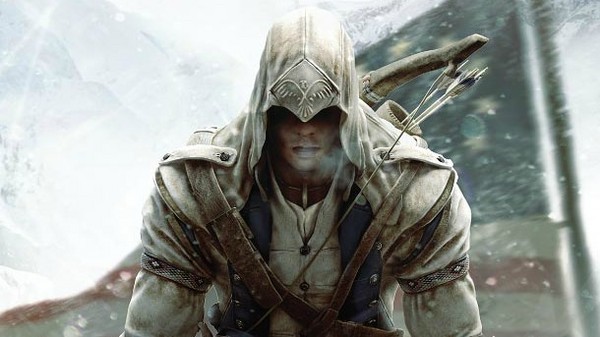
Story:
As with all Assassin’s Creed games the story line plays a large part in the experience. The entire single player mode relies heavily upon how compelling the plot is. While the franchise reached story telling heights with the powerful and overall emotionally resonant story of Assassin’s Creed: Revelations, Assassin’s Creed 3 falls somewhat short of that benchmark.
Like previous Assassin’s Creed titles this game features 2 plots that play out parallel to one another, in this case the Desmond story and the Connor story. Fans of the series would know Desmond’s story by now, but Connor’s is something completely new. Set within the American Revolution, Connor is a young Native American boy born to a British man named Haytham (we will talk more about him in a moment) and a Native American woman whose name is incredibly long but prefers to go by Tio. Throughout the course of the game we see how Connor grows up and the man he becomes. Throughout the course of the game we see him as a child, a teen and ultimately a man. But before we get into that plot we see the story of Haytham, Connor’s father, when the cave influences a bleeding effect and the Animus somehow controls Desmond into having memories of the American Revolution, which in it self is fairly lazy writing to be quite frank.
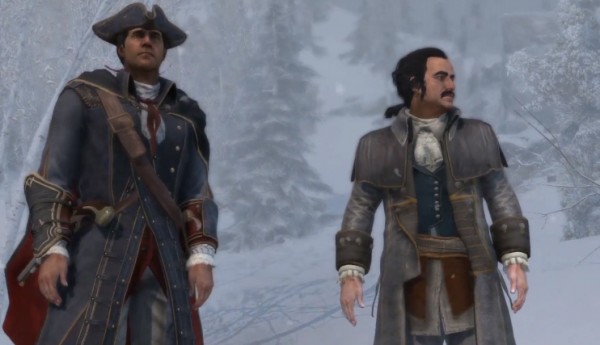
The game begins with you playing as Haytham a stalwart Brit with a great deal of compassion for those who lack freedom. After venturing the America Haytham becomes embroiled in a struggle over the freedom of a tribe of Native Americans in which he ultimately saves them and falls for the Native American woman who will go on to bare his child. This is all well and good. Haytham is developed quite well and we come to know him in the few hours of which his portion of the game takes place in. Unfortunately it is the conclusion of Haytham’s introduction where in the game makes its first stumble plot wise. We see a bizarre plot twist occur regarding Haytham that completely goes against all his characterization leading up to that point and it only further stumbles as his characterization bounces around throughout the rest of the game by which point he becomes a walking plot device with sadly very few dimensions other than outright villainy. The saddest part of all is that by the time Connor’s story is resolved, Haytham is never redeemed as a character, there is no catharsis.
The same problem can be attributed to the other 2 main characters Connor and Desmond, both of whom receive relatively lackluster and confusing send-offs. Considering that the game is said to be the last to feature Desmond it is very disappointing how they chose to end his story. Fans of the series have followed this character for a very long time and for him to receive the ending in which he did was utterly disappointing. Things really needed to be brought full circle for Desmond. Instead it was all hastily tied up in the sloppiest manner possible. This really should have been a cathartic and powerful conclusion to a story that has spanned 5 games, instead it feels like an inconsequential footnote.
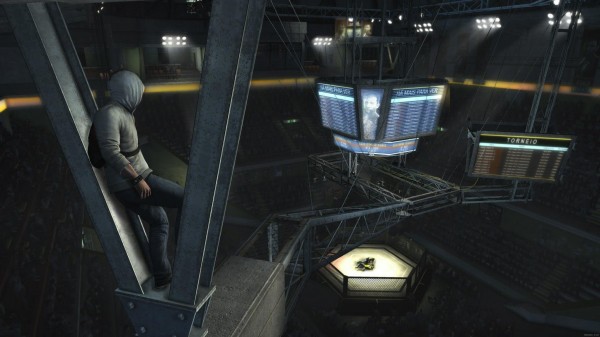
Both plot-lines are inherently interesting, but due to lack of substantial connective tissue between both plots it is difficult to escape the feeling that Desmond is just messing around in the Animus whilst waiting for the far more exciting and urgent feeling missions of the present day arise. This is of course no knock towards the rich and well-realised American Revolution setting. It just doesn’t really lend it self too well to the Assassin theme. At times Connor simply feels like a vengeful Native American more than he does an Assassin. This is problematic as it makes it difficult to connect the story of Connor with that of Desmond on anything other than a faint resemblance between the two characters and the fact they both suffer daddy issues. Although Connor’s plot does help Desmond in the end the large majority of his story feels besides the point and lacking the same intensity of the absolutely excellent Desmond missions. At times the Desmond missions are so good that they make you wonder why the entire game couldn’t have simply taken place in the present day.
Despite the rather inconsistent writing in this game, there are some truly great narrative moments. In particular Desmond’s return to Abstergo which provided a truly captivating finish to a long standing plot thread. The emotion was there and it truly felt as though Desmond has come a long way since his beginnings in the first game. This was the pinnacle of Desmond as a character, everything had built up to this and for that alone it was a good chapter in a game filled with highs and lows.
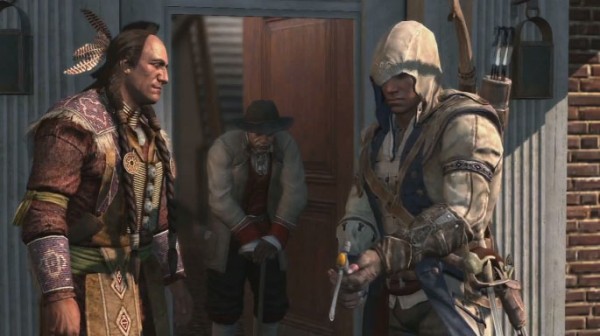
In terms of Connor’s plot the characterization was without a doubt the biggest issue, but the story itself was quite engaging. From Connor’s humble beginnings and his long road to vengeance, the is a great story arc told here which ultimately succeeds regardless of the bumps along the way.
Assassin’s Creed 3 is ultimately the series lowest point in terms of narrative. The characterization is spotty at best and makes it difficult to understand and empathize with these characters and their motivations. Despite the over abundance of plot twists that seemingly exist for the sake of shocking the player, the plot points that revolve around true and genuine human emotion such as Connor’s love of his family and desire for vengeance or even Desmond’s longing to be free of the Assassin’s life are what will be remembered from the game. Those honest and heartfelt moments allow this often murky tale to succeed despite it’s flaws.
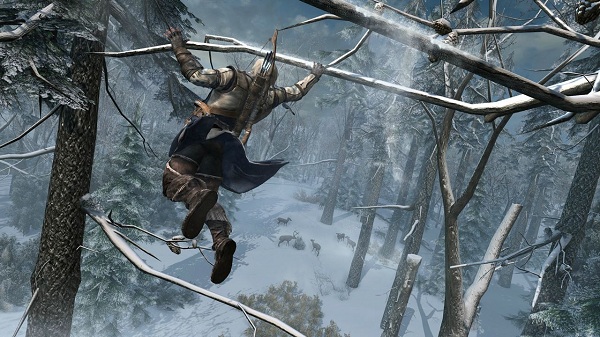
Gameplay:
With Assassin’s Creed 3 Ubisoft have tried to improve upon the formula they have built over the course of the now 5 games in the series. Unfortunately the results are mixed, mostly due to the fact that the game feels relatively unfinished. But I will get into the game’s bugs later, let’s talk about the games mechanics.
First of all the most prominent aspect of the gameplay as with all Assassin’s Creed titles is the free-running which unlike previous games in the series is mapped entirely to one button in this game, the right trigger button. This is a good idea, in theory, but in practice it is even more flawed than the previous right trigger and A button method of free-running. The reason why is that there is now no option to simply run, there is only free-running. What this means is that you will find yourself accidentally climbing onto everything and anything you happen to mistakenly bump into. This is especially troublesome when you are partaking in chase missions which require a degree of accuracy otherwise your target will outrun you and be lost. It’s a very temperamental system as a whole and doesn’t exactly work as advertised, it is said that you cannot jump to your death unless you tap the A button, this is not in fact true as Connor will at times jump in bizarre and odd directs or jump onto an object that can barely be stood on and will slip and fall to his death. Although it sounds sloppy, which it is, tree-running is incredibly addictive and one could spend hours simply exploring the Frontier from the treetops. As a whole though, the idea of mapping all of it to one button did have potential to work wonders and expel many of the series prior issues, but not enough work went into polishing this mechanic and working out the kinks – an issue that plagues a lot of other facets of the gameplay.
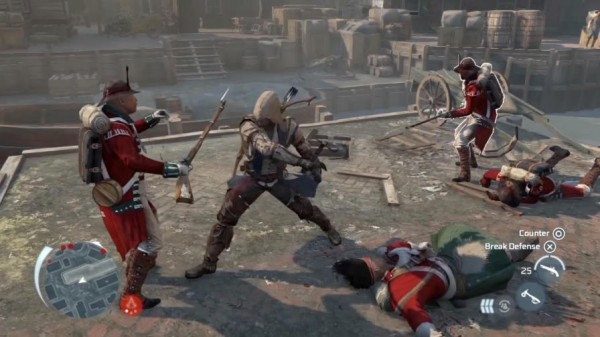
The game’s combat mechanics are also altered to be more focused on countering. This adds a greater level of difficulty to combat but at the cost of slowing the pace of battles. At times combat can become very tedious due to the difficulty of countering when mobbed by enemies. You can still perform the one hit kills the series is famous for but there is a greater difficulty in doing so. While a increased challenge in terms of combat is a good thing, you feel as though you are taking far more damage then you really should be and fighting mobs is a tedious fare to say the very least. However in simple one on one conflicts the new fighting mechanics truly shine, its just the mob combat that needs some work. Having to counter in order to properly attack an enemy is both an improvement but also a step backwards. Assassin’s Creed is known for it’s fast paced action whereas the action seen in Assassin’s Creed 3 is notably slower paced than anything the franchise has produced to date. It only makes matters worse when guns present in the game take 10 seconds to reload, sure it is realistic, but is realism worth the cost of slowing down what by all rights should be intense fast paced action? I don’t think so.
The other form of combat present in the game is the much publicized naval warfare. This aspect of gameplay feels as though it was lifted from another game entirely. It is an interesting addition but largely out of place and is an odd shift gameplay wise, much like the den defense was for Assassin’s Creed: Revelations. At least Revelations didn’t force you to partake in that aspect more than once. However Assassin’s Creed 3 requires the player to engage in multiple naval warfare battles. For some this will be very tiresome and for others it will be quite enjoyable. The entire naval warfare aspect is really a case of you love it or you hate it. There is no real middle ground due to the incredibly different experience it provides in comparison to the rest of the game. It looks and feels like it belongs in another game and because of this it heavily relies on the player’s particular taste.
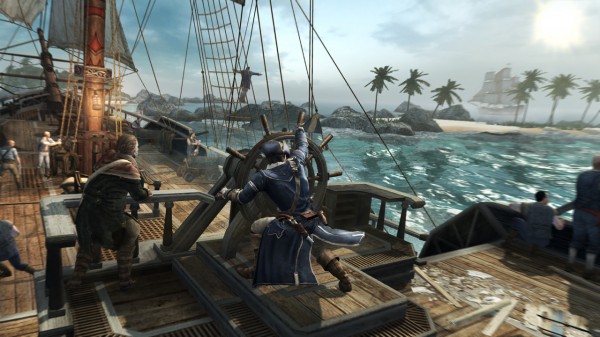
While there is a large amount of new introductions in this game it also features a return of a gameplay aspect that hasn’t been in the series for a while now. That is the ability to ride a horse. In previous games that featured horses this means of travel felt like an afterthought and ultimately unnecessary due to lack of an open world big enough to necessitate riding a horse. Assassin’s Creed 3 on the other hand features a vast and luscious open world environment that is as large as it is beautiful. One could literally spend days exploring this environment just to see everything that it holds. Right from the get-go there is a necessity for horse travel (until you unlock fast-travel in later portions of the game). This works well enough when travelling in a city such as Boston, but take the horse into the Frontier and it becomes incredibly difficult to control the animal as it seemingly has a great disdain for small rocks and any kind of flora that may come anywhere near it. This results in the horse often glitching in bizarre ways and very frequently jumping right through a tree and becoming stuck within it. This is quite disappointing as the horses are really a necessity when travelling through the Frontier.
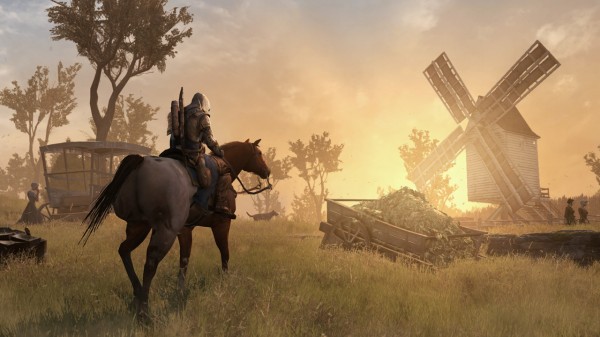
The Frontier it self is an incredible feat in and of itself, it’s a vast land filled with all sorts of terrain, animals and people alike. It is in the Frontier that players can engage in another highly publicized aspect of the game, that being hunting. There is a great amount of different types of animal to be found in the Frontier and if you spend enough time exploring you will discover that these animals have certain territories and locations in which that inhabit. This is a great amount of detail for a mechanic that is in the end just a throwaway addition that doesn’t effect the overall plot in any significant way. Hunting is just a fun little feature that for the most part goes off without a hitch, there is the occasional graphical glitch but hunting these animals feels very authentic and is a lot of fun to play.
Now it has to be said that despite a day one patch for the game there is still a large amount of glitches and bugs present in the game, some are easily overlooked but others can downright ruin the experience. There are a large variety of bugs present in the game the worst of which is the endless loading screen, a seemingly random game crashing bug that occurs sporadically. If you are interested in seeing any of the other bugs for yourself simply search ‘Assassin’s Creed 3 glitches’ on Youtube and you will be sure to find many hilarious and often confusing glitches in the game.
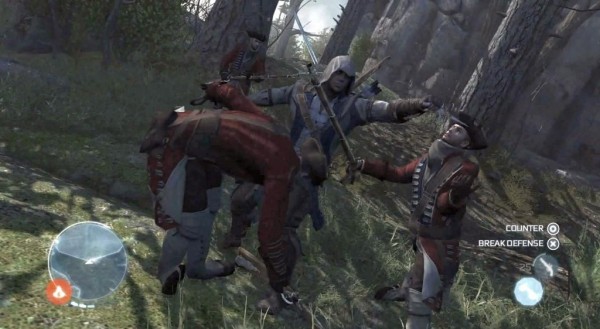
While the single-player gameplay is very much hit and miss and could do with a substantial amount of polish, the multi-player component is undoubtedly the greatest multi-player experience on offer this year. It’s odd that such a weak single-player experience is packaged right alongside what is an incredible and truly inspired multi-player that is worth the price of admission alone.
Ubisoft have taken the already excellent multi-player aspect of Revelations and polished it until it was golden. The Assassinate mode in particular is now well refined and free of the issues it suffered in the previous installment. All of the classic modes have returns such as the crowd-pleasing Wanted mode, but it is the new modes that truly shine here. The Domination mode in particular is a great play on the Headquarters mode seen in FPS titles multi-player in which you must maintain control of a location for as long as possible to earn points. It’s a great addition mostly due to the great deal of variety it contributes. Throw in the new Wolfpack mode to the mix, a take on the horde mode which requires players to kill a number of enemies to progress and you have one of the most inventive and varied multi-player experiences on the market today.
While the single-player is riddled with several nagging issues, almost none of them are present in the multi-player mode which stands as reason alone to own this game. The multi-player is sure to add an insurmountable number of hours of gameplay for players to entertain themselves with and gives an incredible amount of replay-ability to a title that’s single-player couldn’t be relied upon to provide that.
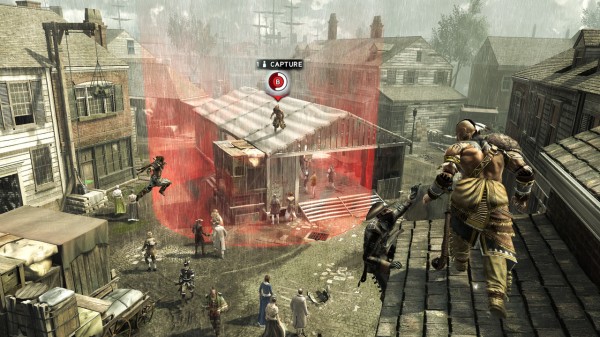
When it’s all said and done, Assassin’s Creed 3 is a fun game, that succeeds not because of it’s flaws but in spite of them. The single-player experience leaves a lot to be desired both story-wise and in terms of gameplay. The entire single-play mode in it self is the sloppiest the series has employed to date. Despite that though, there is just too much content in this game to ignore. There is so many little inclusions that don’t have any significant bearing on the game but are there for players to enthuse themselves with regardless, it truly feels like you could explore every inch of this world but still miss something. It is simply that detailed. It may be flawed but it is still an impressive feat and even if the single-player leaves players frustrated with it’s issues, there is always the picture perfect multi-player mode to escape into for a few hours.
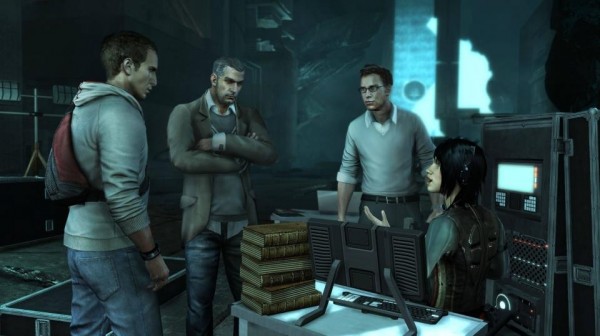
Visuals and Audio:
From the outset the very fact that this game would tackle the American Revolution there was a large platform of possibility for beautiful aesthetics and I’m pleased to say that Ubisoft has really brought the New World to life. The world is vast and beautiful in it’s intricacy and variation. The Frontier is easily the most visually appealing aspect of the game and I don’t blame anyone for getting distracted with exploring this awe-inspiring landscape. It is both well-conceived and fully realised, something that Ubisoft ought to be proud of. The visual splendor and sheer grandeur of the world in this game feels very real, the illusion of reality only breaking when the occasional graphical glitch arises. The cities featured in the game are also fully realised however hang too heavily on the brown and grey for it’s colour palette. At times the brown and grey hues can be somewhat ugly and overbearing but the overall mass of each city has enough variety if you seek it out. While Assassin’s Creed 3 doesn’t feature the same architectural beauty as the Ezio trilogy, the Frontier alone is beauty of a different nature altogether.
Aurally the game implements a similar soundtrack to it’s previous installments with many orchestrated tracks that manage to fit any and every mood that the game tries to portray. It’s a very ethereal musical experience as a whole and continues the impressive standard that Ubisoft has set with the franchise. When it comes to the voice work of the cast, everyone hits the mark. The performances of each character were well done. As a whole there were no issues with the voice work.
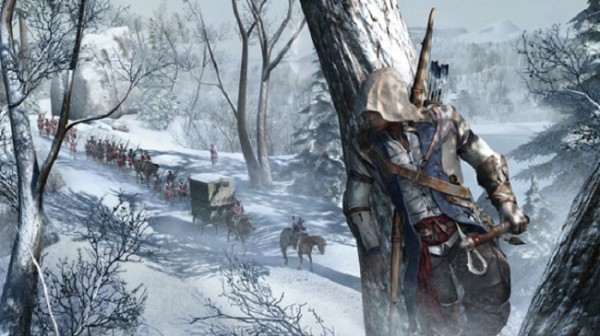
Overall:
Assassin’s Creed 3 is a game that I really wanted to love. This should have been the definitive Assassin’s Creed game, the one that ends this era with a bang, revolutionizes the franchise and ushers in a new chapter in the Assassin’s Creed universe. But it wasn’t that game. It was inconsistent in quality from start to finish, featured the weakest story mode in the franchise to date and ended in a way that doesn’t even come close to doing this great franchise justice. If there is any reason to purchase this game it is without a doubt the excellent multi-player mode, the high point of an overall rushed package that really deserved better. Ubisoft have shown in the past they are capable of brilliance with this franchise, it’s a shame that one of the greatest stories in recent gaming history had to end on such a note. Don’t get me wrong though, Assassin’s Creed 3 is a fun game for the most part, it’s just held back by a number of flaws that quite simply can not be ignored. We wanted a revolution, but much like Connor’s search for freedom, we learnt that a revolution can only stem from one thing – Chaos.



